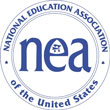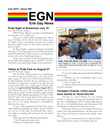Educators double down on protecting rights of LGBTQ students and members
Escalating and unprecedented attacks on students and educators prompt action
WASHINGTON - July 4, 2016 -In light of the recent murder of 49 Latino and Black lesbian, gay, bisexual, transgender, or questioning (LGBTQ) people in Orlando, Fla., and on the heels of escalating and unprecedented misguided legislative efforts to pass discriminatory laws, the nearly 7,000 delegates at the NEA Representative Assembly (RA) today approved a new business item calling on the Association to join a national effort to prevent acts of violence targeted at LGBTQ individuals and to protect their civil rights. The RA is the top decision-making body for the 3 million-member National Education Association.
"Every student matters, and every student has the right to feel safe, welcomed, and valued in our schools," said NEA President Lily Eskelsen García. "Educators are responsible for our students' education and safety, including those students who are perceived or identify as lesbian, gay, bisexual, transgender, or questioning. Unfortunately, due to the recent horrific event in Orlando and the actions in state houses across the country where politicians are playing games with the lives of children and teens who are seen as different, now is the time for educators to boldly and assertively assume a leadership role in this human and civil rights issue."
LGTBQ students are more likely to face bullying and harassment in school, causing them to do poorly in school and even prompting them to drop out at higher rates than other students. Additionally, they suffer high rates of homelessness than other students. A 2013 national school climate survey conducted by GLSEN, the leading national organization fighting to end anti-gay bias in K-12 schools, identifies the rate of verbal and physical harassment by gender identity. The findings indicate that transgender students are far more likely than other students (63 percent vs. 40 percent) to avoid bathrooms because they feel uncomfortable or unsafe. Nearly 56 percent of lesbian, gay, bisexual, and transgender students feel unsafe at school because of their sexual orientation, while almost 38 percent feel unsafe due to their gender expression.
"The action the delegates took today is not only timely and right but also necessary to ensure that everyone – regardless of gender identify or expression – has the opportunity to thrive and achieve," continued Eskelsen García.
The NEA RA delegates call for a multi-pronged approach involving national partners, state, and local affiliates of the NEA to take action to promote a culture of safety, support, and affirmation that ensures civil rights and advocacy for LGBTQ members and students. They call on the NEA to support the pending legal challenges to newly enacted laws that would, in effect, license discrimination against LGBTQ individuals.
The RA delegates also call on the U.S. Department of Education to enforce Title IX's prohibition against discrimination based on gender identity. Earlier this year, the NEA issued legal guidance describing the legal rights of transgender students. In addition to spelling out their rights, the guidance provides to NEA members, state affiliates, and the general public key best practices.
"We are uniquely positioned to lead the discussion, address these emerging issues, and create a safe, supportive environment for LGBTQ students," said Eskelsen García. "This timely action creates a legal and political roadmap for educators and allies to advocate for the rights of transgender students and stand together in opposition to anti-transgender legislation, policies, and practices. We owe it to our students. They need to see us take a bold stand against discrimination whatever form it takes."
Follow us on Twitter at @NEAMedia and keep up with the conversation at #NEARA16
The National Education Association is the nation's largest professional employee organization, representing more than 3 million elementary and secondary teachers, higher education faculty, education support professionals, school administrators, retired educators and students preparing to become teachers. Learn more at www.nea.org.



